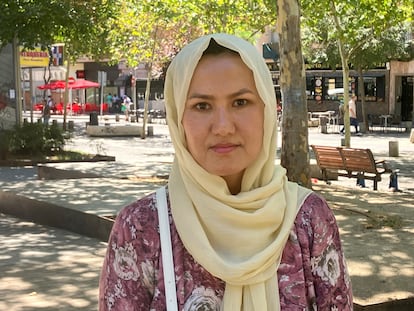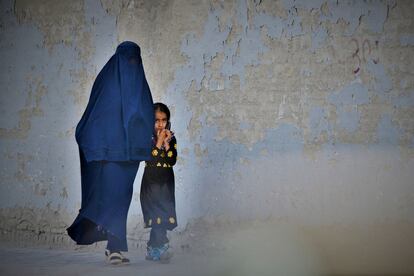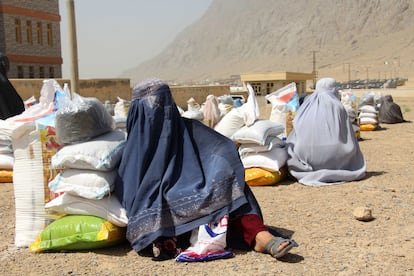Two years under Taliban rule in Afghanistan: ‘I never thought the world would forget about us so quickly’
Those who left and those who could not flee speak of a country in ruins and decry the world’s apathy towards the humanitarian crisis and the lack of rights, mainly for women, which a UN report describes as ‘gender apartheid’


It is difficult to come across an Afghan who does not remember where they were and what they were doing on August 15, 2021, when the Taliban marched into Kabul after the U.S. and allied troops had withdrawn. Emotions and memories flood back. “The university was closed and we left in terror.” “The city had collapsed, there was no transportation and I walked for many miles.” “Was that really happening? It was like a bad dream.” It is also practically impossible to meet a person from Afghanistan who would claim that their life has not been radically transformed since events two years ago.
“I had a beautiful house and a job that I loved. I lived with my family, I had friends and I was pregnant. But I lost my baby, I fled my country without my husband and now I live here alone. I’m safe, but do you think I’m happy, do you think I can sleep at night knowing my family’s situation in Afghanistan?” Hussnia Bakhtiyari weeps tears of loneliness and anger on a terrace in the center of Madrid, where she has been living for eight months. In Kabul, she was a respected attorney devoted to defending the rights of women and children who had been mistreated. She is currently living in a women’s refuge center in Madrid, sends the €50 a month she receives for her expenses to her family and is hoping to work as a cleaner in a restaurant, once her Spanish improves, so that she can scrape by when the welfare support runs out.
On August 15, 2021, when messages began to arrive about the Taliban’s impending arrival, Hussnia ran home from work. “I spent seven months cooped up and scared to death. I lost my baby. I was six months pregnant, it was a girl,” recalls the woman, who belongs to the Hazara community, a Shiite minority that is heavily discriminated against and persecuted by fundamentalists. She eventually fled with a brother and crossed the border into Pakistan concealed under a burqa. “Women lost their place in society overnight. Now they are only suitable for marriage and having children. They would have killed me because of my work,” says Hussnia, almost apologetically. The attorney spent six months in Islamabad, temporarily living in a hut, like other compatriots she had met in the city. In January 2023, she was among a group of prosecutors, judges and lawyers to be evacuated and taken in by Spain.
“Women lost their place in society overnight. Now they are only suitable for marriage and having children.”Hussnia Bakhtiyari, Afghan attorney
The United Nations High Commissioner for Refugees (UNHCR) estimated that by the end of 2022, there would be 5.7 million forcibly displaced Afghans, although the actual figure could be much higher. According to the Spanish Commission for Refugee Aid (CEAR), Spain transferred 2,785 Afghan nationals from Pakistan between August 2021 and August 2022. Last year, 1,581 applications for international protection from the country were registered with a 98.7% acceptance rate.
“I can’t be happy. I’m afraid that my sisters, who can’t work or study, will be kidnapped and my brothers will be killed. My mother died and my father, who is older, is taking care of everyone. A few days ago, the Taliban went to my home, searched everything and beat my brother. This is all because of me. They’re paying the price for me,” says a distraught Bakhtiyari, as she shares a video sent by her family showing the state the place was left in after the raid.

“Even if it costs me my life”
Before starting the WhatsApp conversation, Mohammad (not his real name), a 27-year-old journalist working for a local news agency in Kabul, demands to see identification and proof of his interviewer’s work and insists that nothing should be published that might identify him. “Sorry, but I live under Taliban persecution,” he says.
“We journalists have to obey their demands and we cannot report on what is actually happening. If we do, we receive death threats, we could be arrested and tortured. I work for hardly any pay, but I’m not going to quit my job, I want to continue even if it costs me my life,” he explains, pointing out that four journalists were arrested in different parts of the country last week. “I feel stuck here and hopeless. I never thought the world would forget about us so quickly or that Afghanistan would regress so precipitously,” he ponders aloud, recalling “the injustice” involved in the virtual disappearance of his female colleagues from the newsroom.
Najiba (not her real name) is one of these absentees. For the past year, she has been working covertly from Kabul for Afghan Times, a media outlet founded after the return of the Taliban, where several female reporters write stories about the country’s women. The young woman never uses her name on her articles and only her parents and a handful of friends know what she does professionally — even if they don’t understand her. The fear she lives in means she is reluctant to make a video call. When her image finally emerges on the other end of the call, the mistrust and nervousness of this individual in her twenties with huge, sad green eyes is quite palpable. “I write about Afghan women. I try to spread their stories beyond the borders of Afghanistan,” she explains. In recent months, she has chronicled the day-to-day lives of women writers, fashion designers and other females struggling to continue to be who they were two years ago.
“Women and girls in Afghanistan are subjected to grave discrimination that may amount to gender-based persecution — a crime against humanity — and it is tantamount to gender apartheid.”Richard Bennett, UN Special Rapporteur
According to figures from the Afghan Independent Journalists Association, published by local media outlet Tolo News, more than 300 media outlets have closed down since August 2021, with some 5,000 journalists losing their jobs, primarily women. Those who remain, like Mohammad and Najiba, have to endure a lack of access to information, censorship, violence and financial instability.
The Taliban have also forced NGOs to stop employing the more than 50,000 Afghan women workers and barred local female UN employees, with exceptions for health and education. Additionally, women over the age of 12 have been banned from studying since December. Despite this dramatic regression of rights, the UN has chosen to stay in Afghanistan and maintain the humanitarian aid which more than 28 million Afghans, or two-thirds of the population, depend on.
“Women and girls in Afghanistan are subjected to grave discrimination that may amount to gender-based persecution — a crime against humanity — and it is tantamount to gender apartheid,” the UN Special Rapporteur Richard Bennett alleged in July, describing the situation of women in Afghanistan as the “worst” in the world.

“Up to the last moment”
Adela Omid and her family did not foresee the looming crisis. “Or we didn’t want to see it, but up to the last moment we didn’t think the Taliban would make it to Kabul,” the 24-year-old Afghani says, in fluent Spanish from Gijón, where she has been living for the past two years. The young woman was studying in her third year of journalism in the city of Herat, while doing an internship at a radio station. The family had travelled to Kabul for a few days and was unable to return home. “And I know I won’t be returning for a long time,” she says. Adela had relatives who had worked with foreign military personnel and diplomats and several family members were able to be evacuated. She ended up in Spain, along with her mother and a brother.
“When I arrived, I didn’t even know how to say ‘hello,’ but I’ve worked hard because I want to go to university and become a nurse to help women in my country when I return home,” she explains. Adela is currently taking a course to become a social-health technician and is already doing paid internships in a center for people with disabilities. The monthly financial support they received as refugees is coming to an end soon, two years after their arrival in Spain, and the young woman is distressed. Her rent is €540 and she has applied for grants that have not yet been forthcoming.
“I’m worried about everything: about the direction my country is heading, about my situation, about my brothers who are hiding in Iran, about those who stayed behind and live in fear. But the world has pretty much forgotten about Afghanistan. People are being killed every day, people are starving to death, but it just seems that the Taliban rule has become normalized,” she adds.
Noorullah Shirzada voices the same sense of guilt. The 33-year-old worked for over a decade as a photographer and cameraman for the international media, and that was his ticket out of Kabul to France, where he now lives with his wife and five children. Darman, the youngest of the family, was born in his host country. “It’s tough. We’re slowly integrating, but I’m not relaxed because my younger siblings, who I raised when my mother died, are still there. And they’re under threat because of me, because, for the Taliban, people like me are spies,” he says.
All the prestige he had in Afghanistan is no longer of any use to him. Neither are his photographs, which have been published all over the world. Now he is fighting to be hired by a media outlet as a cameraman, even if it is for training positions. “I was a free journalist and I want to continue to be one. I couldn’t practice under Taliban rules because I want to report the reality, not what they want me to show,” he sadly explains.
“Like a bird in a cage”
In March 2023, this newspaper interviewed Marzia A., founder of a clandestine school for girls in Kabul. The school presented itself as a place for girls to study the Koran, but the Taliban were suspicious and the woman became increasingly harassed. Weeks later, she learned that she was going to be detained and she fled to Iran, where she feels that security for Afghans seeking refuge has also severely worsened. “I’m like a bird in a cage, but at least the girls’ schools have been preserved and have even grown,” she said in a WhatsApp conversation.
Ashraf (not his real name) works as a volunteer at one of these clandestine educational centers for girls in Kabul. During a phone call, the 34-year-old father says he leads a double life: he works eight hours a day as an accountant for a company and helps out at these schools in his spare time. “I document everything that is done because, even if the girls continue studying, there is no certificate or anything to prove their progress. It’s a tragedy what is happening to these girls,” he explains.
The man blames the former Afghan government under Ashraf Ghani and the international coalition, which operated in the country for 20 years, for “everything falling apart so quickly.” “We have lost everything, even our hope for the future. We’re living in a country of lies, a country that no longer exists,” he concludes.
Sign up for our weekly newsletter to get more English-language news coverage from EL PAÍS USA Edition
Tu suscripción se está usando en otro dispositivo
¿Quieres añadir otro usuario a tu suscripción?
Si continúas leyendo en este dispositivo, no se podrá leer en el otro.
FlechaTu suscripción se está usando en otro dispositivo y solo puedes acceder a EL PAÍS desde un dispositivo a la vez.
Si quieres compartir tu cuenta, cambia tu suscripción a la modalidad Premium, así podrás añadir otro usuario. Cada uno accederá con su propia cuenta de email, lo que os permitirá personalizar vuestra experiencia en EL PAÍS.
¿Tienes una suscripción de empresa? Accede aquí para contratar más cuentas.
En el caso de no saber quién está usando tu cuenta, te recomendamos cambiar tu contraseña aquí.
Si decides continuar compartiendo tu cuenta, este mensaje se mostrará en tu dispositivo y en el de la otra persona que está usando tu cuenta de forma indefinida, afectando a tu experiencia de lectura. Puedes consultar aquí los términos y condiciones de la suscripción digital.








































